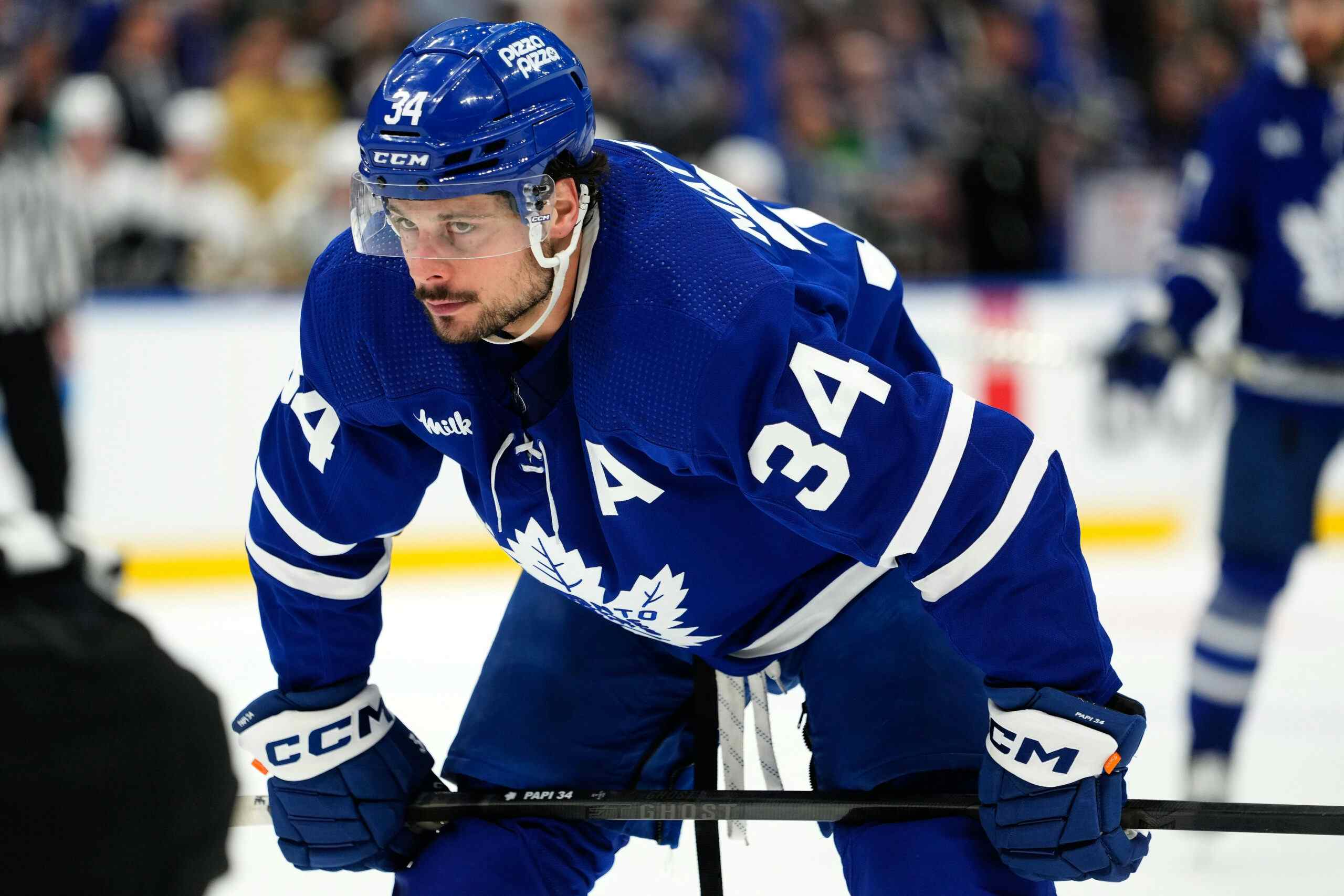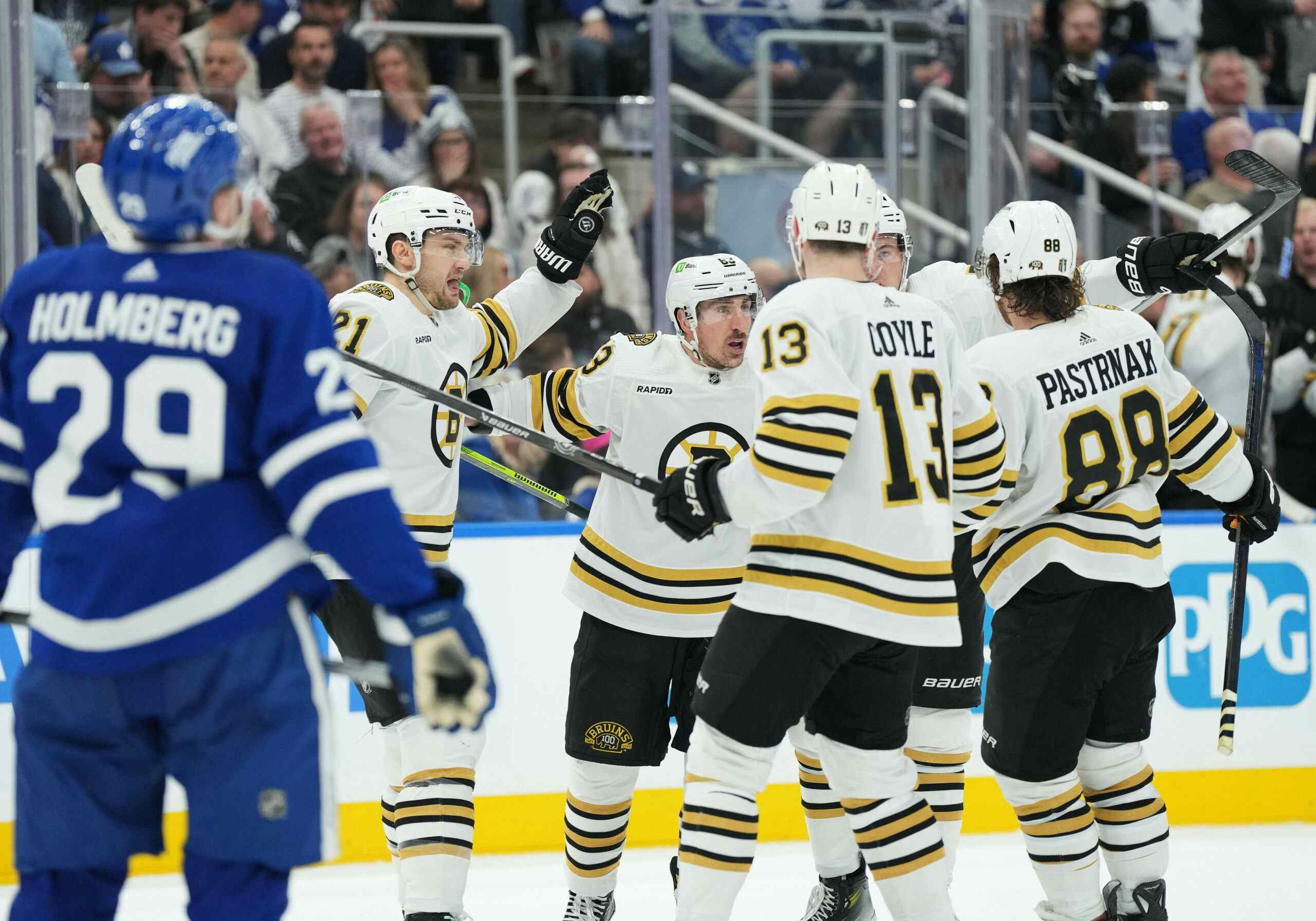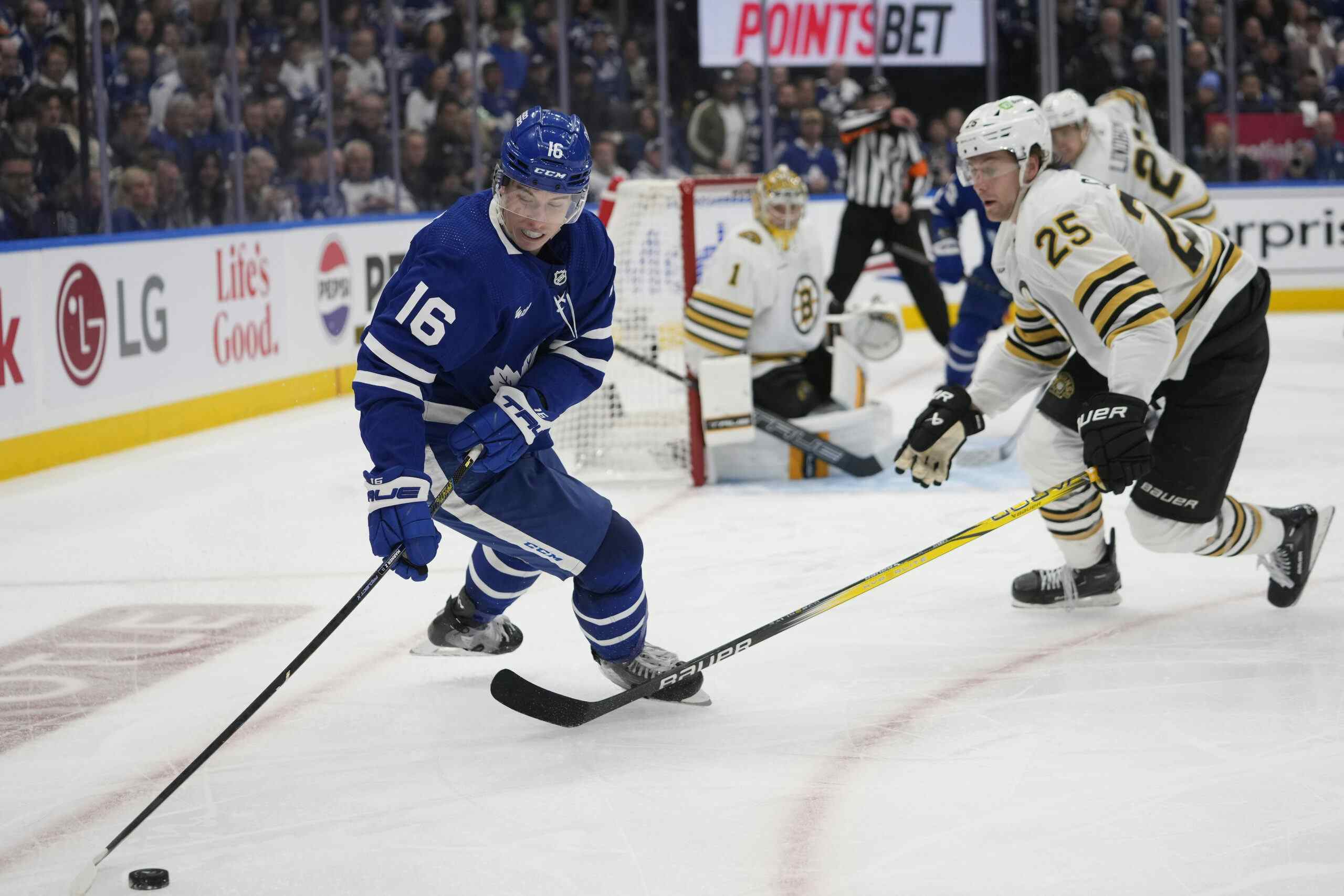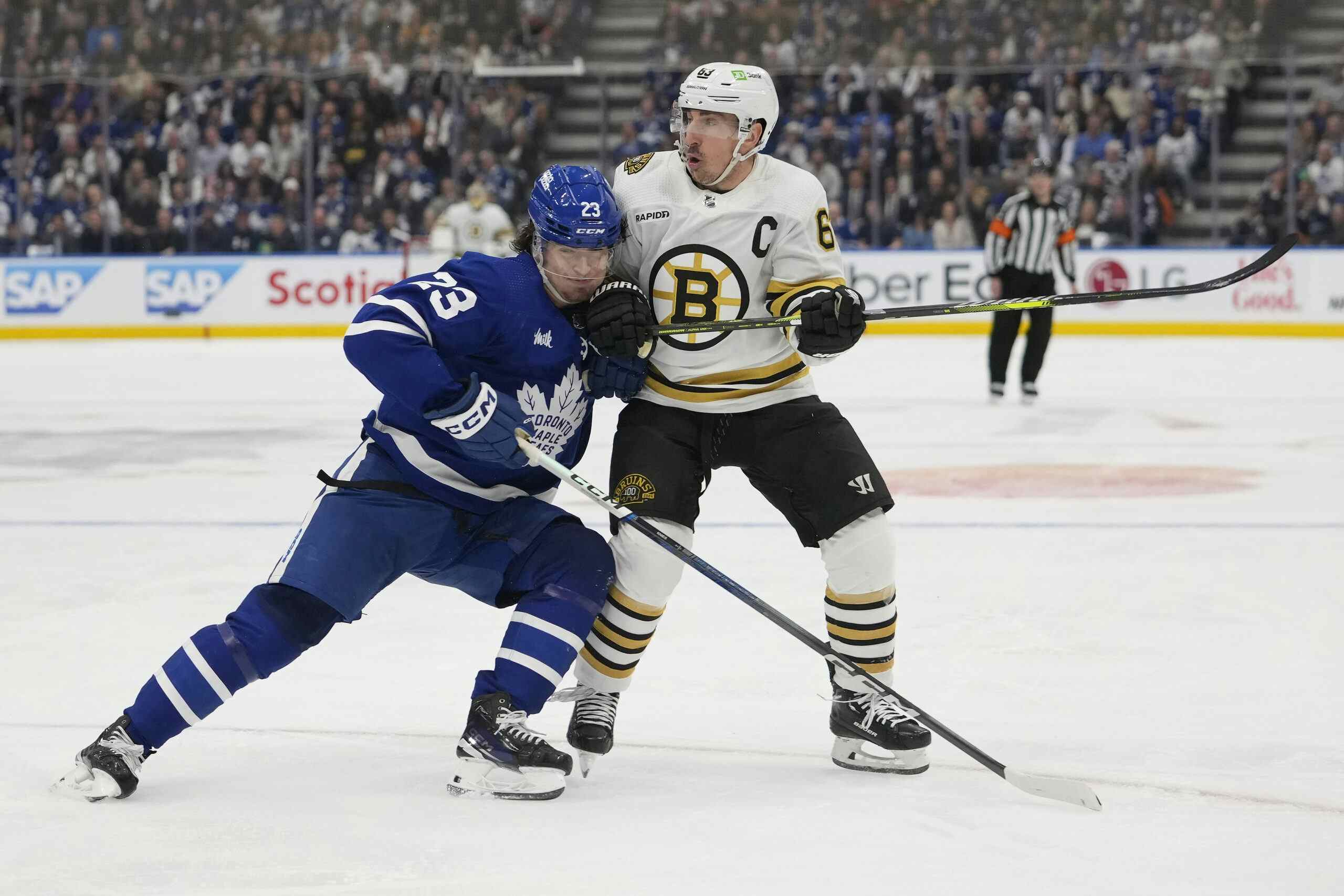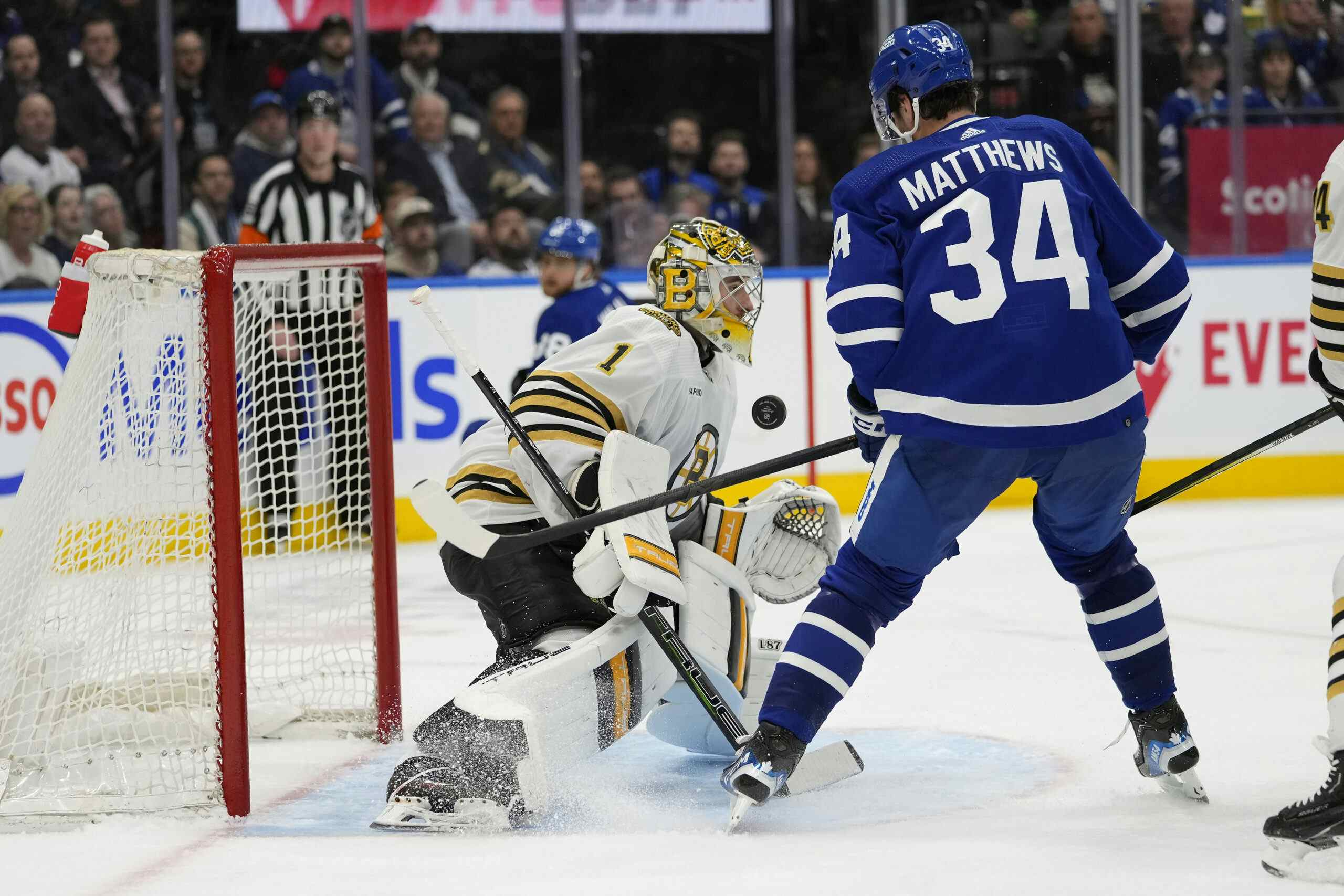Sober second thoughts: The “Meltdown in Beantown”
By Cam Charron
10 years ago
I don’t want to re-hash “The Game” or analyze what went wrong for Toronto in the waning minutes of Game 7 against the Boston Bruins. I will indicate, however, that it’s not like all levels of the Leafs capitulated in the end—offence, defence and goaltending.
A series of highly unlikely events took place in a sequenced order that makes the probability of Game 7’s ending even more unlikely.
Naturally, there will be some hand-wringing about “the Letdown in Beantown” or “the Meltdown in Beantown” and using that particular game as an argument that the young Leafs need to grow, or that the collapse is indicative of a structural issue with the organization dating back to the Harold Ballard years, well, enough. The game was a rarity. No team has ever lost like that, and no team will ever lose like that again. mc79hockey pinned the odds of a team losing like the Leafs did in Game 7 at happening once in every 4757 years.
So while it did happen on Black Monday, it won’t happen again. Not even to these Leafs, and it didn’t happen because the Leafs let their guard down any differently than they did in any previous game in a series they held a late lead.
For instance… look at how the Leafs held their leads in Games 2, 5, and 6. With a 3-1 lead with 10 minutes to go, the Leafs were out-chanced by Boston 3-1. In Game 5 holding a 2-0 lead with 10 minutes to go, the Leafs were out-chanced 2-1 (although they gave up three chances in the previous seven minutes) and with a 2-0 lead in Game 6, the Leafs were out-chanced 3-1.
I’m seeing similarities.
It’s a reality of hockey that good teams will press when up against the wall. Don Cherry started all this crap about covering the points, and how the Leafs didn’t want to cover the point, and that’s why goals were scored. The problem with that is that good teams who are good with the puck will work to get the point-men open in the middle of the ice. If you avoid that by having Nik Kulemin shadowing one of the two-pointmen, you’re opening yourself up to a 5-on-3 down low, and that’s probably not a smart move either. The Leafs’ tendencies to sit on leads is a league-wide trend, and even a sports-wide trend. Teams that are ahead play conservatively, and generally aggressive play, while risky, favours attacking teams.
Randomness is huge. James Reimer’s “inexperience” didn’t show late in the game. There’s a reason that these sorts of games don’t happen very much. They seem to, but they don’t. If Reimer’s inexperience cost him, his .923 SV% doesn’t show it (just slightly down from his .924 in the regular season). Reimer proved his worth all series. He was beaten by a good Nathan Horton shot, a bad rebound, a Zdeno Chara screen and a missed clearing opportunity. When you roll spider eyes (eight 1s, a 1-in-1679616 shot) in one of the most-watched hockey games ever, people are going to form conclusions they wouldn’t if the meltdown happened in any old regular season game in November.
It’s unsurprising that when you google “James Reimer inexperienced” and filter ‘News’ the top two results are both Toronto Star entries. Damien Cox, a man who throws a mean right hook only when fighting scarecrows, wrote that “Henrik Lundqvist, it’s fair to say, will pose a larger obstacle than inexperienced James Reimer” because Damien Cox seems to think that Lundqvist’s ‘experience’ is a greater asset than his talent. Lundqvist is consistently a top three goaltender in the NHL and the best in the position at the sport.
Rosie DiManno, who took a break from shaming sexual assault victims and wrote about sports, called Reimer “flailing and jittery” and “encapsulated every weakness that has hurt the Leafs this year”. That’s also completely untrue. The Leafs closed out a lot of tight, one-goal games that they didn’t deserve to win and they generally did because James Reimer shut the door more often than not. Toronto went 11-3-5 in one-goal contests. The Leafs, counting playoffs, went 4-1-2 in games where Reimer faced more than 40 shots and 12-6-4 in games he faced more than 30.
The Leafs pushed a seventh game because their best players—Reimer, Phil Kessel, Mikhail Grabovski, James van Riemsdyk, Jake Gardiner, Dion Phaneuf—were their best players. To improve next season, the Maple Leafs need to acquire more “best players”.
MORE REAX
Behind the Globe and Mail’s paywall, David Shoalts wrote about how all good teams suffered some sort of heartbreak prior to winning. Steve Dangle, of course, made the same point a day earlier, for free, on Youtube.
However, I feel that’s more “noise” than “signal”. I would look at the current Leafs and say they’re closer to the 2010 Colorado Avalanche than the 2010 Boston Bruins, a team that relied on percentages to make the playoffs. There are lots of good pieces on both teams, but the Avalanche fell apart because they didn’t try to add to a core and I guess they “believed” their own hype.
The Avalanche had a shot differential of -4.2 and a Corsi Tied of 44.6% and added a single roster player in the offseason: defensive forward Daniel Winnik. The next year they had a shot differential of -2.6, a Corsi Tied of 45.4% but 13 fewer wins as their PDO dropped from 1.015 to 0.992. (Stats via NHL.com and Hockey Analysis)
Hopefully Dave Nonis takes precautions and buys some regression insurance for next season.
Here’s a funny video of some idiot burning his Maple Leafs jersey:
Just had enough. The lockout sure added to my frustration, but after 10 years and one playoff win at home I have to just walk away. Plus the bone-head moves like giving away draft picks for Kessel. Or the crushing pressure put on Leaf goalies by the Toronto media. And on top of that this team has the highest ticket prices and makes the most money of almost any sports team in the world. I will never buy anything that in some way supports this mismanaged team. Good effort by the team this year, but it’s just too little too late.
I find this pretty ironic because if anything really helped the Leafs in the series, it was the Phil Kessel trade. He was on fire. Dougie Hamilton was either a healthy scratch or ineffective and Tyler Seguin was snakebitten right until the very end.
He’ll be back when the Leafs are good. The Leafs will be good when they make more Kessel trades and stop trying to bank on free agents that will never come here unless you give them something ridiculous.
As for a “protest” post, Michael Forbes at Pension Plan Puppets is right on point:
“As much as I wanted to embrace this year’s Leafs, as much I was thrilled by the play of Phil Kessel, James Reimer, Jake Gardiner and James van Riemsdyk, part of me checked-out and I’m not sure if or when I’ll return.The biggest culprit is the lockout.The loss of half a season of hockey was nothing more than a craven cash-grab. A work stoppage that could have, and should have addressed certain deficiencies in the game and, more importantly, tried to fix the broken revenue model. Instead, it was nothing more than the filthy stinking rich taking a bigger slice of the pie from the disgustingly wealthy.”
Forbes is a great writer and a great thinker and he piles on the NHL, the Maple Leafs and the media for creating a culture that’s inhospitable for the longtime fan of the game and the team.
From Backhand Shelf, here is a posting on Kijiji for a broken 50″ plasma TV, “used lightly to watch Maple Leaf playoff hockey” that “suffered an unrelated impact that rendered the screen useless”.
The best thing written, purely about the game, came from Sean McIndoe over at Grantland:
We all know Those Games. They’re the ones where the sports gods skip past winning and losing and move straight to abject cruelty. They come in different flavors, but the end result is always the same: stunned silence, a sick feeling, and a nagging concern that you shouldn’t be doing this to yourself. Watching sports is supposed to be fun. Those Games aren’t.
It was a historical collapse or a historical comeback, depending on which side of the border you’re on and the purpose of the story you’re telling. Sean’s column is one that every sports fan can rationalize with, as every fan in any sport cheers for one team that just can’t seem to get it done and whose milestones are met more with heartbreak than with joy.
I’ve written it a bunch of times before and it never chances. If you’re a sports fan, “hope” is the worst. Hope turns into “expectations”, and “expectations” except for a single fanbase, turns into “heartbreak”. “Hope” sucks.
Recent articles from Cam Charron

